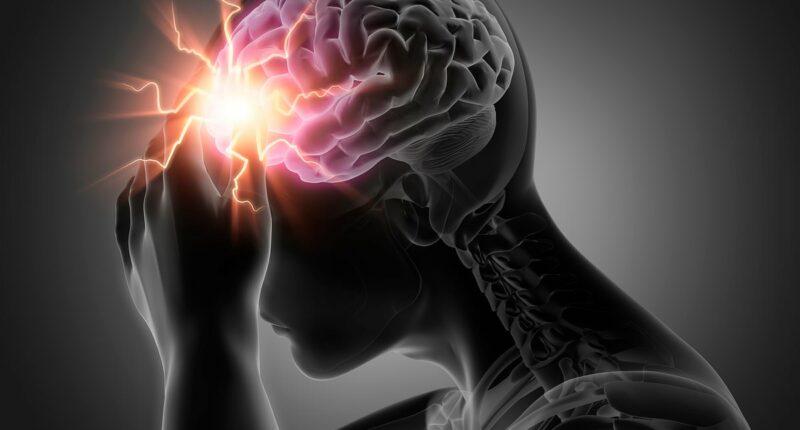Share this @internewscast.com
A leading neurologist has issued an urgent warning over using a massage gun to relieve neck tension as this could trigger a potentially life-threatening stroke.
Dr Baibing Chen, from the University of Michigan shared the warning with his 163,000 Instagram followers, stating that this is one of three common activities he would never do to protect his brain health.
In the video, which has been viewed over 8million times, he also urged his followers to stop blasting loud music through headphones and warned against holding in a sneeze.
‘I would never use a massage gun on my neck,’ the neurologist said.
‘This is because the vertebral and carotid arteries in the neck are vulnerable to damage from the repetitive shear forces from a massage gun.’
These arteries make up a vital part of the circulatory system and supply the brain with blood and life-giving oxygen.
Dr Chen added that this repetitive damage can increase the risk of an artery tearing, encouraging the formation of blood clots, restricting blood flow and triggering a stroke.
A stroke is a serious medical event that can cause permanent brain damage or even death.

Dr Chen warned his followers against using massage guns to relieve neck tension, blasting loud music through their headphones and holding in a sneeze
Dr Chen added that using a muscle gun with direct pressure can also dislodge hidden plaques that line the artery wall.
‘This can cause a clot to travel to the brain and lead to an ischemic stroke.’
This happens when a blockage cuts off blood supply to part of the brain.
According to the NHS, around a quarter of strokes in the UK are caused by a narrowing or blockage of the carotid arteries.
The main symptoms of a stroke can happen suddenly and include facial weakness where one side of the face may fall making it hard to smile; arm weakness which impacts a person’s ability to lift both arms; and speech problems.
Anyone who thinks they are having a stroke are urged to call 999 immediately.
Other symptoms include weakness or numbness down one side of the body, blurred vision, confusion and memory loss, headaches and nausea or vomiting.
Stroke is a leading global cause of death and disability.
There are more than 100,000 strokes in the UK each year, about one every five minutes.
For this reason, Dr Chen also warned against holding in a sneeze.
He said: ‘This is because sneezing generates high internal pressure that’s higher than car tire pressure.
‘Holding [a sneeze] in forces this pressure into delicate areas and may lead to ruptured ear drums, torn throat tissues and even air leaking into the chest.
‘In rare cases the sudden spike in pressure can rupture blood vessels in the brain leading to subarachnoid hemorrhage or intracerebral bleeding—especially in individuals with aneurysms or weakened arteries.’
This type of hemorrhage is an uncommon type of stroke caused by bleeding on the surface of the brain which can be fatal.
In this instance, there are usually no warning signs but according to the NHS this type of stroke can happen during physical effort or straining, such as coughing, holding in a sneeze or lifting something heavy.
Common symptoms include a sudden excruciating headache, stiff neck, nausea and vomiting, sensitivity to light, blurred vision, typical stroke-like symptoms and loss of consciousness.
A subarachnoid haemorrhage is considered a medical emergency.
Finally, Dr Chen advised turning down the volume before plugging in headphones.
‘Loud music isn’t just bad for your ears it’s actually bad for your brain as well,’ he said.
Tackling hearing loss early could delay the development of dementia for a number of years, promising new research suggested this year.
Studies have long suggested that around four in 10 cases of the memory-robbing condition could be preventable.
Now experts believe that up to a third of cases could be attributed to hearing loss.
‘This is because when the brain struggles to process sound it reallocates resources away from memory and thinking, increasing cognitive decline,’ Dr Chen explained.
Dementia affects around 982,000 people in the UK and studies show that those with untreated hearing problems may be up to give times more likely to develop the condition.
‘Sounds over 85 decibels, similar to city traffic, can cause damage over time whereas exposure to 100 plus decibels, like a concert or many earbuds at max volume can cause permanent hearing loss in as little as 15 minutes,’ he added.










